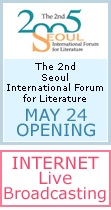
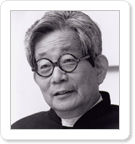 |
ÓÞË°Ëíß²ÕÍ
Kenzaburo Oe
Novelist. Born in Japan in 1935. Graduated
from the Department of French Literature,
Tokyo University. Published his first
novel, Bud-Nipping, Lamb Shooting, in
1958. Beginning with A Personal Matter
(1964), part of his work derives from
his relationship with his own brain-damaged
son. Other works are rooted in traditional
stories and myths but relate them to
life in the modern world, such as The
Silent Cry (1967) and M/T and the Wonders
of the Forest (1986). He completed the
publication of his trilogy The Flaming
Green Tree in 1995, just after he received
the 1994 Nobel Prize
in Literature. His next novel was Somersault
(2003). His often angry and politically
charged tales and his gritty, realistic
style set him apart from the mainstream
Japanese literary tradition. He is noted
in Korea for the support he gave to
the campaign protesting at the imprisonment
of the Korean poet Kim Ji-ha in the
1970s.
|
|
|
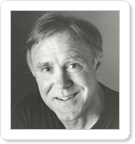 |
Robert
Hass
Poet. Born in 1941 in San Francisco
(U.S.). Majored in English Literature
at Stanford University. He served for
two years (1995-7) as Poet Laureate
of the United States. Very active as
a translator, he has shown great interest
in the poets of Asia and is particularly
noted for his admiration of the work
of the Korean poet Ko Un. He currently
teaches English Literature
at U.C. Berkeley. He collaborates closely
with Gary Snyder and other writers on
environmental issues. His books of poetry
include Sun Under Wood (1996); Human
Wishes (1989), Praise (1979), and Field
Guide (1973). He is currently a Chancellor
of The Academy of American Poets.
|
|
|
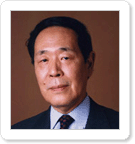 |
æåãùñìåé
Shigehiko Hasumi
Critic. Born in Tokyo (Japan)
1936, he majored in French Literature
at the University of Paris. He is famed
as a film critic, critic of symbolic
culture, and specialist in French literature.
He has served as a professor in the
Faculty of Education, University of
Tokyo, head of that faculty, and president
of the University of Tokyo, at which
he is now an emeritus
professor. His publications include
The Invention of Mediocrity, Antitheory
of the Japanese Language, Mnemonic devices
in cinema, and Film lunatics: Here,
there, and everywhere. He has deeply
influenced major Japanese film directors
such as Hideo Nakata, Kiyoshi Kurosawa,
Shinji Aoyama.
|
|
|
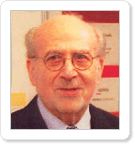 |
Tibor
Meray
Novelist, journalist. Born in Budapest
(Hungary) in 1924. After studying Latin
literature he worked as editor of a
literary review until he was sent to
North Korea as a military news-correspondent
during the Korean War. He spent fourteen
months there and witnessed the signing
of the 1953 Armistice at Panmunjom.
He supported the Hungarian Prime Minister
Imre Nagy in his opposition to Stalinism
and after the 1956 Hungarian
Uprising took refuge in Paris where
he currently heads the Hungarian Human
Rights Commission. Among his main publications
are Reporting from Korea and The Truth
on Germ Warfare.
|
|
|
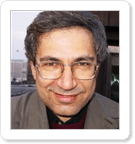 |
Orhan
Pamuk
Novelist. Born in Istanbul
(Turkey) in 1952. After studying architecture
in Istanbul Technical University, he
studied at the Institute of Journalism
at Istanbul University. His first novel,
Cevdet Bey and his Sons (1982), won
the Orhan Kemal Novel Prize. His historical
novel The White Castle (1985), extended
his reputation abroad. Other works include
New Life (1995), My Name is Red (2001),
and Snow (2004). His
novels are rich with allusion to old
Sufi stories and traditional Islamic
tales. He has recently published a book
about Istanbul, a city that fascinates
him. He is by far the country's best-selling
author and his books are now translated
into 20 languages.
|
|
|
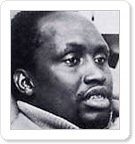 |
Ngugi
Wa Thiong'o
Novelist, essayist, and playwright.
Born in Kenya in 1938. He studied English
Literature in Kampala (Uganda) then
went for graduate studies in England.
As a novelist Ngugi made his debut with
Weep Not, Child (1964). It was the first
novel in English to be published by
an East African author. The transition
from colonialism to postcoloniality
and the crisis of modernity have been
central issues in Ngugi's writings,
in addition to the conflict between
the individual and the community. The
River Between (1965) has as its background
the Mau Mau Rebellion (1952-1956), as
does A Grain Of Wheat (1967). Ngugi
was imprisoned without trial for a year
in 1978 for his involvement with a communal
theatre in his home village. In 1980
Ngugi published the first modern novel
written in Gikuyu, Caitaani Muthara-Ini
(Devil on the Cross), rejecting the
use of English in truly African writing.
Ngugi's critical works include Decolonizing
the Mind (1986) and
Moving the Center (1993). He left Kenya
in 1982 to live in self-imposed exile.
He is Distinguished Professor of English
and Comparative Literature and Director
of the International Center for Writing
and Translation at the University of
California at Irvine. Ngugi's books
have been translated into more than
thirty languages. His novel, Wizard
of the Crow, will be published in English
translation in 2006.
|
|
|
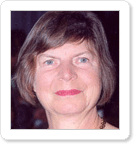 |
Margaret
DRABBLE
Novelist, biographer and critic. Born
in Sheffield (U.K.) in 1939. Studied
English at Cambridge. She became an
actress and worked for the Royal Shakespeare
Company at Stratford-upon-Avon before
her first novel, A Summer Birdcage was
published in 1963. She has published
more than a dozen other novels, including
Jerusalem the Golden (1967), The Waterfall
(1969), The Needle's Eye (1972), and
The Realms of Gold (1975), as well as
a trilogy The Radiant Way (1987), A
Natural Curiosity (1989) and The Gates
of Ivory (1991). After visiting Korea
for the first Daesan Writer's Forum
in 2000, she wrote and published The
Red Queen (2005), inspired in part by
the tragic memoirs of an 18th-century
Korean crown-princess and in part by
the author's experience of modern Korea.
She is editor of both
the fifth (1985) and the sixth (2000)
editions of The Oxford Companion to
English Literature. She has traveled
widely to speak at events organized
by the British Council throughout the
world and is active in organizations
assisting children with special needs
in Cambodia and elsewhere.
|
|
|
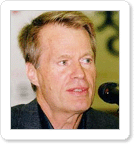 |
Jean-Marie
Gustave Le Clezio
Novelist. Born in Nice (France) in 1940,
where he did all his studies. In 1963,
he published his first novel, Le Proces
Verbal (Interrogation), which received
the Prix Theophraste Renaudot. Between
1967 to 1970, he mainly lived with a
tribe of Embera Indians in the Panamanian
jungles. He then taught literature at
the University of New Mexico and translated
Native American myths. In 1978, he published
Mondo et autres histoires (Mondo and
other stories). The author of over 30
books, including La fievre (1965, Fever),
Le deluge (1966, The flood), L'extase
materielle (1967, The material ecstasy),
Chercheur d'or (1985, Gold seeker),
Desert (1987, Desert) et La quarantaine
(1995, Quarantine). His latest novel
is Revolutions (2003,
Revoluions) He returned to Nice in 1996.
During his last visit to Korea in 2000,
he visited the temple Unju-sa and wrote
a poem on his experience. Other major
titles include Trois villes saintes
(Three sacred cities), Hasard (Chance),
and Poisson d'or (Goldfish).
|
|
|
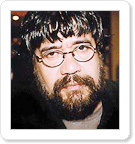 |
Luis
Sepulveda
Born in Chile in 1949. Imprisoned in
1979 by the Pinochet regime while still
a student, for over two years. Exiled,
he first traveled in South America,
founding theatrical groups in a number
of countries, then took part in a UNESCO
research project on the impact of colonization
on the Amazonian Indians. The result
was his first novel, Un Viejo que leia
Novelas de Amor (The old man who read
love stories). Other
works include Diario de un killer Sentimental
(Diary of a sentimental killer), Desencuentros
(Failed meetings), Nombre de torero
(Name of a bullfighter) and Mundo de
fin del mundo (World at the end of the
world). In 1982, he went to live in
Germany, then in 1996 moved to Spain.
|
|
|
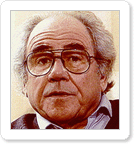 |
Jean
Baudrillard
Sociologist, cultural critic, and theorist
of postmodernity. Born in 1929 in Reims
(France). One of France's leading thinkers
and a living legend, he was the first
member of his family to attend university.
He began to teach at the University
of Paris in Nanterre in 1966, and continued
to teach in the University of Paris
until 1987. Deeply influenced by the
student revolution of 1968, he was associated
with Roland Barthes, to whose semiotic
analysis of culture his first book,
The Object System (1968) is clearly
indebted. He was also influenced by
Marshall McLuhan. Some suggest that
his thought has shifted "from the
post-Marxist (1968-71), to the socio-linguistic
(1972-77), to the techno-prophetic."
In recent years he has become best known
as prophet of the implosion of meaning
that attends the postmodern condition.
The two books of Baudrillard's post-Marxist
phase, The System of Objects (1968)
and Consumer Society (1970) examine
the psychological imperatives of consumption
in an advanced capitalistic economy.
His impatience with Marx bloomed into
explicit dissociation in For a Critique
of the Political Economy of the Sign
(1972) and The Mirror of Production
(1973). In the Shadow of the Silent
Majorities (1983) argues that contemporary
society has entered into a phase of
implosion. He presents
a new method of analyzing society in
his most famous book America (1988).
In The Perfect Crime (1996), Baudrillard
turns detective in order to investigate
a crime which he hopes may yet be solved:
the "murder" of reality. Other
major titles include Seduction (1979),
Simulacra and Simulation (1981). He
is currently Professor of Philosophy
of Culture and Media Criticism at the
European Graduate School in Saas-Fee,
Switzerland..
|
|
|
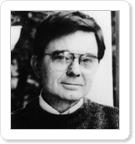 |
Robert
Coover
Novelist. Born in Iowa (U.S.) in 1932.
At Indiana State University, he studied
Slavic languages before moving on for
further studies at Southern Illinois
State University and the University
of Chicago. His first novel, The Origin
of Brunists won the 1966 William Faulkner
Award. He is widely regarded as one
of America's most influential living
writers, author of some fifteen groundbreaking
books of fiction, including The Universal
Baseball Association, Inc., J. Henry
Waugh, Prop. (1968), The Public Burning
(1977), Spanking the Maid (1981), A
Night at the Movies (1987), Ghost Town
(1998) and Stepmother (2004). He has
been lauded as an "old school postmodernist."
The New York Times Book Review has called
him the "master of hypertext."
He taught at a number of universities,
including the University of Iowa and
Brown University.
|
|
|
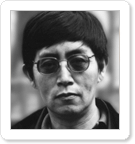 |
ÝÁÓö
Bei Dao
Poet He is also the author of short
stories and essays. Zhao Zhenkai was
born in 1949 in Beijing. His pseudonym
Bei Dao, literally, "North Island,"
was suggested by a friend as a reference
to his provenance from Northern China
and his typical solitude. He began to
write poems at an early age. His early
work was a source of inspiration during
the April Fifth Democracy Movement of
1976. Writing in free verse, Bei Dao
is best known for intensely compressed
images and cryptic style. He has been
in exile from his native China since
the Tiananmen Square massacre of 1989,
when he was in Berlin. He first visited
Korea in 1990. He has
taught at the University of California
at Davis. He is currently the Mackey
Poet in Residence at Beloit College.
Among the English translations of his
works are Old Snow (1991), Forms of
Distance (1994), Landscape Over Zero
(1996), Unlock (2000), Blue House (2000).
Midnight's Gate, a collection of essays,
has recently been published.
|
|
|
 |
Masao
Miyoshi
Thinker and essayist. Emeritus professor,
University of California at San Diego,
Masao Miyoshi has long been a controversial,
prominent figure in Japanese studies
and in the American academy in general.
Some of his recent work include reflections
on the humanities in an increasingly
capitalist university. Major works include
The Divided Self: A Perspective on the
Literature of the Victorians (1969),
Accomplices of Silence: The Modern Japanese
Novel (1975), As We Saw Them: The First
Japanese Embassy to the United States
(1979), Postmodernism and Japan (1989).
More recently he has mainly published
shorter articles or co-edited
volumes with multiple contributors.
Major recent papers include "Japan
Is Not Interesting," (2000), "Ivory
Tower in Escrow," (2000), and "Turn
to the Planet: Literature, Diversity,
and Totality" (2001). He participated
in the First Daesan International Forum
in 2000.
|
|
|
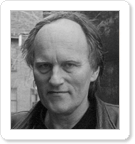 |
Erling
Kittelsen
Has written poetry, fables
and plays, as well as children's books.
Born in 1946 in Oslo (Norway), he studied
philosophy before published his first
volume of poems, Vile fugler (Wild birds,
1970). His writings are not only read
but also widely discussed and utilized
by other artists, independent theatre
groups and students. He is currently
involved in a number of projects designed
to translate poems written in Chinese,
Arabic, Latvian etc into Norwegian.
Plays by him include Abiriels l©ªve (Abiriel's
lion, 1988) and Pa himmelen (In heaven,
2000).
|
|
|
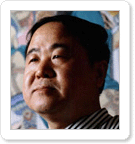 |
Ø°åë
Moyan
Novelist. Born as Guan Moye
in 1956 in rural Shandong, northeastern
China. Has adopted the nom de plume
Mo Yan, meaning "don't speak"
in Chinese. At the age of 20, he joined
the People's Liberation Army. He began
writing in 1981 and entered the literature
department of the PLA Art Academy in
1984. He has had nine novels and over
70 short stories published in the past
22 years., quite a number of which have
been translated into a number of languages.
The film version of the novel, Red Sorghum,
won first prize in the Golden Bear awards
at the Berlin Film Festival in 1988.
His writing has gained him a considerable
audience not only in China, but overseas,
where he is considered one of the most
talented and interesting
Chinese writers. His most recent work,
Forty-one Bombs, (2003) focuses on the
problem of modern China's rampant corruption.
Here, as in much of his work, he employs
sarcastic art and black humor. Works
that have been translated include The
Garlic Ballads; Shifu, You'll Do Anything
for a Laugh; The Republic of Wine; and
Big Breasts and Wide Bottoms.
|
|
|
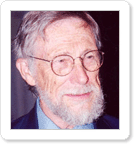 |
Gary
SNYDER
Born in 1930 in San Francisco
(United States) and brought up in Oregon
and Washington State. He received his
BA in anthropology at Reed College,
Portland, in 1951. Between working as
a logger, a trail-crew member, and a
seaman on a Pacific tanker, he studied
Oriental languages at Berkeley (1953-6),
was associated with Beat writers such
as Ginsberg and Kerouac, lived in Japan
(1956-64), later studied Buddhism there.
He now teaches literature and 'wilderness
thought' at the University of California
at Davis. He has been described as an
eco-poet and an eco-warrior. His Mountain
and Rivers Without End project was begun
on April 8, 1956 and is considered an
"epic of geology, prehistory, and
mythology." His main publications
include: Riprap (1959), Myths &
Texts (1960), Mountains and Rivers Without
End (1965), Turtle Island (1974), Axe
Handles (1983), The Practice of the
Wild (1990, prose), No Nature (1993).
He won a Pulitzer Prize for Poetry in
1975 for Turtle Island, and his No Nature
made Snyder a finalist for the National
Book Award in 1992. When Snyder published
Mountain and Rivers Without End in 1996,
he was awarded at least 5 major prizes.
|
|
|
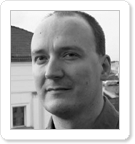 |
Thomas
Brussig
Novelist and dramatist. Born
in 1965 in Berlin (Germany). After six
years working on construction sites,
as a museum porter, dish-washer etc
began to study sociology before going
on to study drama and film. He is one
of Germany's most visible post-unification
writers. His first novel, Wasserfarben
(Watercolors), was published in 1991
under a pseudonym. His novelistic account
of the fall of the Berlin Wall, Helden
wie Wir (1995, Heroes Like Us), has
been adapted into an award-winning stage
play and film, and translated into numerous
languages. The film
Sonnenallee, based on his novel Am kurzeren
Ende der Sonnenallee (1999, At the shorter
end of Sun Alley) and for which he wrote
the screenplay, became one of the most
successful German films of the late
1990s with its touching portrayal of
the adolescent experience in East Berlin.
The novel Wie es leuchtet (How bright
it is), about the fall of the GDR, was
published in 2004.
|
|
|
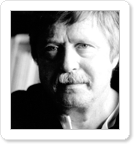 |
Wolf
Biermann
Poet, dramatist, essayist, song-writer,
translator. Born in Hamburg (Germany)
in 1936. When he was six years old his
father was killed in Auschwitz. In 1953
he settled in the GDR and studied Political
Economy, Mathematics and Philosophy
at Humboldt University, Berlin. He soon
began to write poems and songs which
did not adhere to the individual demands
of Socialism, and drew the attention
of the secret police. In 1963 his first
play, Berliner Brautgang, was not allowed
to be performed. Subsequently, his work
could only be published in the West,
including his first volumes of poetry
Die Drahtharfe (1965, The wire harp)
and Mit Marx- und Engelszungen (1968,
With the tongues of Marx and of Engels).
In 1976, while Biermann was on a concert
tour in West Germany, he was deprived
of his citizenship. The protest which
he thereupon raised is often considered
the beginning of the end of the GDR.
Biermann is also active as an essayist
for different newspapers. The freshness
and immediacy of his style also mark
his translations from French, Russian,
Finnish and English.
He has adapted the Yiddish epic Gro©¬er
Gesang vom ausgerotteten judischen Volk
(Great song of the extermionated Jewish
people) by Jitzchak Katzenelson, who
was killed in Auschwitz. An adaptation
of forty of Shakespeare's sonnets will
appear shortly. He has been awarded
Berlin's Fontane Prize (1969), the Georg
Buchner Prize (1991) and the National
Prize of the German National Foundation
(1998).
|
|
|
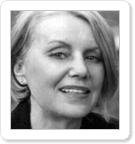 |
Vera
Grigorievna Galaktionova
Novelist. Born 1948. Graduated
from the Maxim Gorki Literary Institute
in Moscow. Her works focus on Chernobyl,
on regional disputes such as that in
Karabakh (along the frontier between
Azerbaijan and Armenia), the divisions
within the Rusian spiritual unity of
Russia, the reasons for the collapse
of the Soviet Union and hostilities
between different ethnic groups, investigating
the historical mechanisms underlying
these social divisions. Her main works
include The Mighty Cross, The Winged
House, On Buyan Island, Quiet Night.
|
|
|
